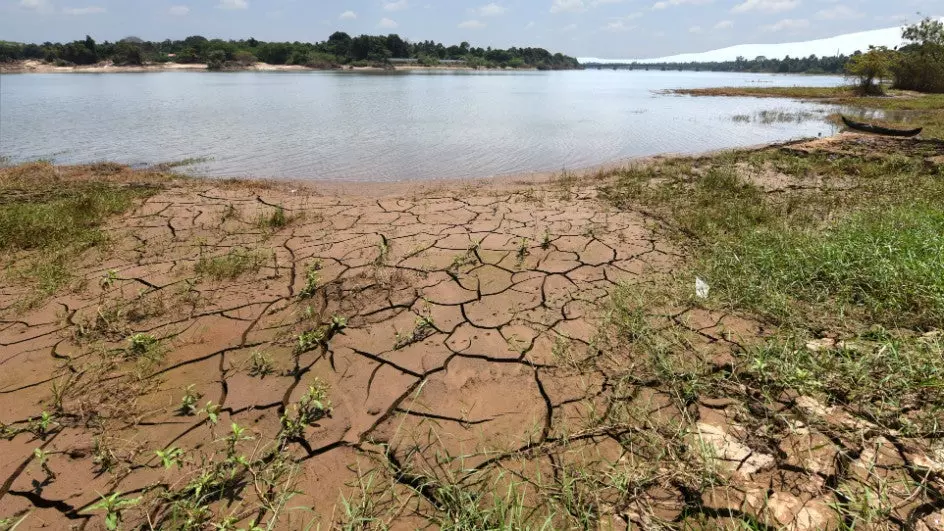
Kerala stares at severe drought as state records 44 per cent deficit in rainfall
The rainfall forecast for the next two weeks also shows a below-normal pattern, said IMD Kerala Director K Santhosh

Kerala, the gateway of the monsoon in the country, is staring at the worst drought of the past few years as the state has recorded a 44 per cent deficit in seasonal rainfall, officials said on Friday.
For the period June 1 to August 16, Kerala received only 877.2 mm of rainfall whereas normal rainfall figures recorded for the southwest monsoon in the state are 1,572.1 mm, according to the India Meteorological Department (IMD). This translates to a 44 per cent deficit this season.
Rainfall data of the seven days from August 10 to 16 illustrate how acute the situation is. There has been a deficit of 94 per cent during that period, as rainfall recorded was a mere 6.5 mm compared to normal rainfall of 109.6 mm.
Power crisis looms
Idukki, where Kerala’s biggest hydroelectric power project is located, has recorded the lowest rainfall this season up to August 16, with a deficit of 60 per cent.
“The rainfall forecast for the next two weeks also shows a below-normal pattern,” IMD Kerala Director K Santhosh told PTI, adding that it’s possible at present to predict whether the remaining monsoon period would make up for the deficit.
Meanwhile, Idukki Reservoir, which is the backbone of Kerala's electricity production, has record low water levels. “The water level in Idukki at present is just 31.13 per cent (of capacity) against 80.2 per cent during the corresponding time last year,” Sajeesh, technical assistant to the Director, Generation (Civil), Kerala Electricity Board Limited (KSEBL) said. With no fresh inflows, power generation at the Idukki hydroelectric station would be affected.
In the second-largest power project at Pathanamthitta’s Kakki, the water level is 35.6 per cent, way below the 62.42 per cent level during August last year. At Wayanad’s Banasura Sagar reservoir, the third-largest power generation plant in the state, the water level is better at 61 per cent, but it is much below the 92 per cent level recorded in August last year.
Drinking water woes
Drinking water reservoirs in the state are also in a similar state. Supply to the capital, Thiruvananthapuram, will be hit if rainfall is deficient during the upcoming northeast monsoon as well.
“At present, we have drinking water available for the next 100 days at the Peppara Dam. If we do not get northeast monsoon rains, then things are going to be difficult,” Soumya S, Assistant Engineer, Dams, Kerala Water Authority, told PTI.
The situation is precarious in other parts of the state as well. When Idukki recorded the lowest rainfall, it affected the water level in all the rivers that flow into the Arabian Sea from the central parts of Kerala.
Agrarian sector hit
Farmers in the state, especially those from districts such as Idukki and Palakkad, are bracing for complete crop loss this year. “We have had only two or three rains since January. This is the time to sow seeds, but there is no water. We are also going to face a severe drinking water crisis. The agriculture office gave us vegetable seeds to grow for the Onam market, but we could not do anything,” SP Venkatachalam, a tribal farmer from Santhanpara, Idukki, said.
KP Rajappan Nair, another farmer from Pooppara, Idukki, echoes his concerns. “This year, agriculture is going to be a complete loss due to the unavailability of water. The Pooppara area is well known for its agriculture, but this Onam we are not going to have any of our products in the market,” Nair said.
Many higher altitude areas in the state already face a drinking water crisis, as the groundwater table has depleted due to the weak monsoon.
“As per our estimation, the groundwater levels in Kerala have also gone down compared to the corresponding period last year,” Dr CP Priju, senior scientist, Hydrology and Climatology, Centre for Water Resources Development and Management (CWRDM), said. He said a detailed study regarding the depletion of groundwater levels in the state is yet to be carried out.
Rising mercury
Similarly, the maximum temperature in the state has also been three to four degrees higher compared to the corresponding period last year. “When we had good showers during this period, the temperature levels used to be lower. However, this year, the average maximum temperature is higher by 3 to 4 degrees Celsius,” IMD Director Santhosh said.
The El Nino (warming of surface waters) in the Pacific Ocean has weakened the westerly winds, and the cyclone formations in the Arabian Sea and the Bay of Bengal just ahead of the monsoon could have adversely affected monsoon rainfall in Kerala, the IMD director explained.
“Now it is the break monsoon period as the monsoon trough is now located somewhere over the Odisha coast. This may further move towards the Himalayas, bringing more rain to the North-Northeast region and Nepal and taking the rain away from our region,” Santhosh said.
Kerala is now pinning its hopes on the northeast monsoon, which is expected between October and December.
(With agency inputs)

